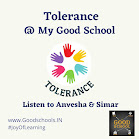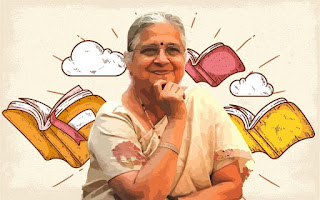Reflection on Today's Session at My Good School
Today's session of My Good School was truly enlightening and left an indelible mark on our hearts and minds. We were privileged to have Mrs Brinda Ghosh, ma’am, share with us the poignant tales from The Inner Life of Animals, illuminating the often-overlooked struggles animals face as they grow old. Her narrative not only sensitised us to their pain but also kindled within us a deeper sense of empathy and compassion.
The subsequent Hindi story, “मिस बैब्कॉक की बड़ी उँगली,” masterfully narrated by Mrs Manisha ma’am, wove a captivating tapestry of emotions that kept us enthralled throughout. Its profound meaning continues to linger within us — a testament to the enduring power of storytelling.
Furthermore, Manisha ma’am’s inspiring tale of the deaf nurse imparted a moral that truly touched our hearts: “Don’t let your comfort hurt others.” This poignant reminder of our responsibility toward others will stay with us for a long time.
Thank you.
Iqra Meraj – IX F
Reflection on Today's Session at My Good School
Today’s session was truly inspiring and full of meaningful learning experiences. We were honoured to have Mrs Brinda Ghosh, ma’am, with us, who narrated stories from the book “The Inner Life of Animals.” Through them, we learned that animals, just like humans, face challenges as they grow old — for example, horses find it hard to stand, and some animals even suffer from diseases like dementia. The story encouraged us to imagine life beyond our world and think creatively.
Another heartwarming part of the session was when my friends and I shared our reflections on the GSA retreat held in Varanasi.
Overall, today’s session was a blend of stories, emotions, and values — reminding us of empathy, understanding, and kindness toward both humans and animals. I am truly grateful to Sandeep Dutt, sir, and Jugjiv, sir, for providing us with such a wonderful platform to learn, grow, and reflect.
Ifra Wahid – Sunbeam Ballia
My Reflection
Good morning and Jai Hind!
Today’s class was very interesting and full of learning. First, Manisha Khanna, ma’am, began by asking us some MCQ questions, which made the class lively and fun. Everyone was excited to answer and see who got them right. After that, ma’am told us a beautiful story with a meaningful message that made us think deeply and enjoy learning.
Then, Brinda Ghosh, ma’am, joined our class and continued with the story “The Inner Life of Animals.” She explained how animals also have feelings, emotions, and thoughts just like humans. It was amazing to learn how animals can love, care, and even feel sad. I really liked how both ma’ams made the lesson interesting and easy to understand.
Today I learned many new things and felt happy to be part of such an engaging class.
Thank you!
Soumya Verma – Class 5C
Reflection on Today’s Session
Good morning and Jai Hind!
In my first session with Manisha ma’am, we read a story from Ruskin Bond’s Chapter 3. She began by asking questions related to our classmates and teachers, which made the class interactive. As she read the story, she also explained the meanings of difficult words, which helped us learn new vocabulary.
The second session was held with Brinda ma’am, who read from “The Inner Life of Animals.” During this session, I learned many new English words and fascinating facts about animals.
Thank you to everyone for the session!
Arnav Kumar Singh – Class 5C
Today's Reflection
The session began with Manisha ma’am asking us thoughtful questions to test our values and morals. Her questions made us reflect deeply on how we think and act.
In the second session, Brinda ma’am narrated a story from the book “The Inner Life of Animals.” The author beautifully personified the actions of aged animals, showing how their emotions and behaviours mirror those of humans.
Savita Singh – Class 9D
My Reflection
I attended a session conducted by Manisha ma’am under the Good School Alliance, and it was a truly engaging and meaningful experience. The session began with a fun quiz called “Naughty or Nice,” where we were given different situations and had to choose whether we would act kindly, wrongly, or not care at all. It made us think deeply about our actions and choices in everyday life.
After that, Manisha ma’am narrated a beautiful story by Ruskin Bond about a retired nurse who took care of three children in a small cottage. The story was touching and showed the values of love, care, and kindness, which she explained wonderfully. I actively participated in the quiz, answered the first and second questions correctly, and received appreciation from ma’am.
Overall, the session was inspiring, interactive, and full of valuable lessons that encouraged us to be more thoughtful and compassionate.
Ishika – Class 9A
My Reflection on Today's Session
In today’s session, we had Manisha ma’am, who began by asking us about the values we should have. Then she narrated a story of a “Deaf Nurse,” teaching us about how she communicated with her patients and treated them with care.
After Manisha ma’am’s class, we had Brinda ma’am, who continued with “The Inner Life of Animals.” She asked questions in between and explained difficult words, which helped me focus more.
The session was truly knowledgeable and eye-opening.
Thank you! ✨
Janhvi Singh – Class 5C
My Reflection on Today's Good School Session
Today’s session was full of learning and inspiration. Manisha ma’am started the class with interesting questions that made everyone think. Then she shared a meaningful story that taught us about good values and kindness. The story had a beautiful message that helped us understand how important it is to help others and stay positive.
After that, Brinda ma’am continued the session with “The Inner Life of Animals.” She explained how animals also have feelings, emotions, and care for each other just like humans do.
I really enjoyed both the stories and learned that compassion and understanding make us better human beings.
Thank you!
Talat Bano – Class 5C
My Reflection
🌸 Today’s session was one of the most inspiring classes I’ve attended. Manisha ma’am began with a short talk about values and then told us the beautiful story “The Deaf Nurse.” I loved how it showed that true communication isn’t only through words but through kindness, actions, and care. It made me realise that even small gestures can make a big difference in someone’s life.
After that, Brinda ma’am continued with the story “The Inner Life of Animals.” I was amazed to learn that animals have their own world of emotions and thoughts. It felt heartwarming to understand how deeply they can love and feel.
By the end of the session, I felt thoughtful and happy. The class was not just about learning stories — it was about learning life lessons that will always stay with me.
Thank you! 🌟
Aadhya – Class 5B
My Reflection on Today’s Good School Session
Today’s session was full of learning and inspiration. Manisha ma’am started the class with some interesting questions that made everyone think deeply. Then she shared a meaningful story that taught us about good values and kindness. The story had a beautiful message that helped us understand how important it is to help others and stay positive.
After that, Brinda ma’am continued the session with “The Inner Life of Animals.” She explained how animals also have feelings, emotions, and care for each other just like humans do.
I really enjoyed both the stories and learned that compassion and understanding make us better human beings.
Thank you!!
— Arohi Jaiswal, Class 5B



.png)












